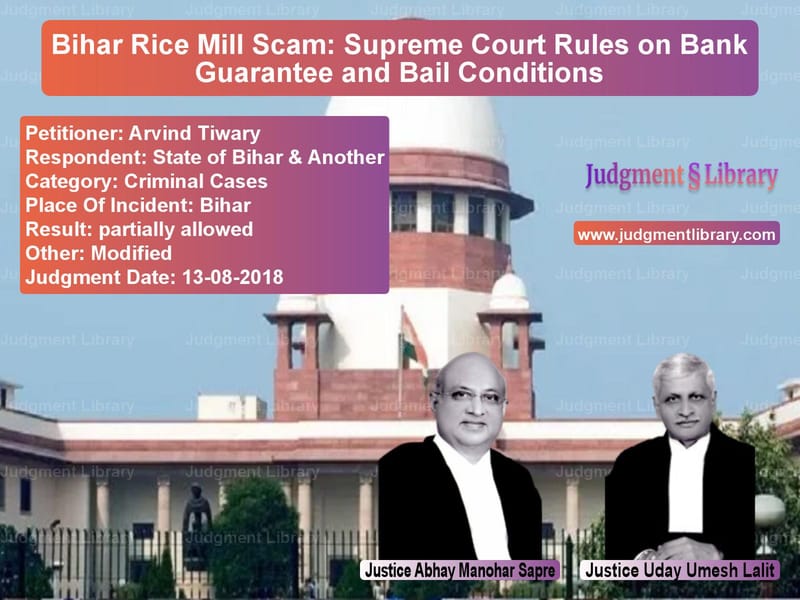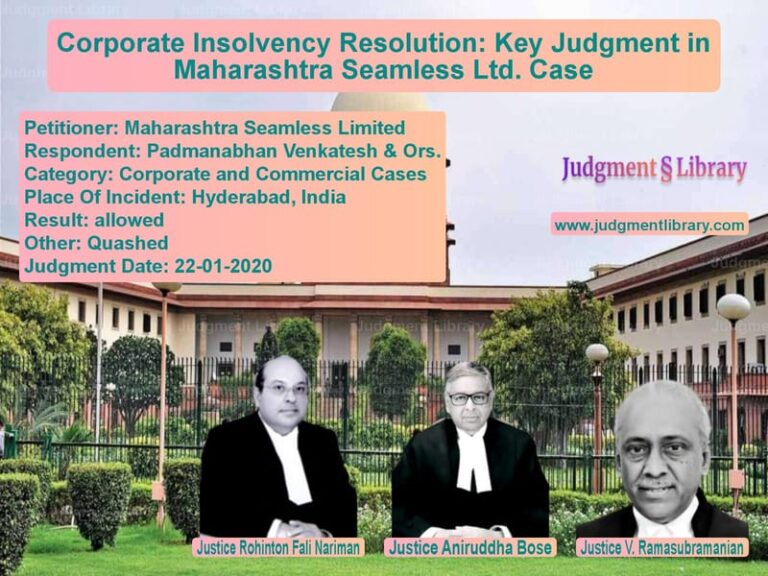Bihar Rice Mill Scam: Supreme Court Rules on Bank Guarantee and Bail Conditions
The Supreme Court of India recently ruled in the case of Arvind Tiwary v. State of Bihar & Another, which involved multiple appeals concerning the alleged misappropriation of paddy meant for the Public Distribution System (PDS) in Bihar. The case revolved around the failure of rice millers to return rice after milling paddy supplied by the Bihar State Food and Civil Supplies Corporation Ltd. The Court addressed the issue of anticipatory bail, the requirement of furnishing bank guarantees, and the liability of millers in securing the state’s financial interests.
Background of the Case
Several rice millers entered into agreements with the Bihar State Food and Civil Supplies Corporation Ltd. to mill paddy and return the processed rice. As per the agreements, the millers were required to furnish bank guarantees or pledge immovable property to secure the value of the paddy received.
However, numerous millers allegedly defaulted on their obligations, leading to financial losses amounting to approximately Rs. 1500 crore. The Corporation lodged multiple FIRs against the accused under Sections 409 (Criminal Breach of Trust) and 420 (Cheating) of the Indian Penal Code (IPC). Many of the accused millers obtained anticipatory bail from the Patna High Court, which required them to deposit only 10-20% of the misappropriated amount.
The State of Bihar and the Corporation challenged these bail orders in the Supreme Court, seeking stricter conditions for securing public funds.
Key Legal Issues
- Whether the anticipatory bail granted to the accused millers was justified.
- Whether the accused were required to furnish bank guarantees equivalent to the defalcated amount.
- The legal validity of enforcing security obligations as per the agreements.
- Whether the Corporation could recover losses by auctioning pledged immovable properties.
Arguments Presented
Appellants’ (Rice Millers’) Arguments
The rice millers contended that:
- They had already pledged immovable properties, and additional bank guarantees were unnecessary.
- The Patna High Court had correctly granted anticipatory bail, as the FIRs were filed with a delay, and they had no intention of misappropriation.
- They were being unfairly targeted despite fulfilling their contractual obligations.
Respondent’s (State of Bihar & Corporation’s) Arguments
The State of Bihar and the Corporation countered by arguing:
- The misappropriation of paddy was part of a large-scale scam amounting to Rs. 1500 crore.
- The agreements required bank guarantees, which many millers had failed to furnish or keep alive.
- Granting bail without stringent financial security would compromise public funds.
- The Corporation should be allowed to auction pledged properties to recover the losses.
Supreme Court’s Observations
The Supreme Court, comprising Justices Abhay Manohar Sapre and Uday Umesh Lalit, examined the contractual obligations of the millers and the financial implications of their defaults. The Court noted:
On the Requirement of Bank Guarantees
“The reference to ‘Bank Guarantee’ in our previous order pertained to guarantees stipulated under the agreements and not to the defalcated amount.”
The Court clarified that millers were only required to furnish guarantees as per their contractual obligations and not for the total misappropriated amount.
On the Legality of Anticipatory Bail
“The anticipatory bail granted by the High Court will stand canceled for millers who failed to furnish or renew their bank guarantees as required by their agreements.”
The Court ruled that non-compliant millers would be taken into custody immediately.
On the Recovery of Public Funds
“The Corporation shall be permitted to invoke bank guarantees and auction pledged properties to recover the losses, subject to due process of law.”
The Court upheld the Corporation’s right to enforce security measures.
Final Judgment and Directives
The Supreme Court ruled as follows:
- Only those millers who had complied with their contractual obligations regarding bank guarantees would retain their bail.
- Millers who failed to furnish or renew bank guarantees as required by their agreements would have their bail revoked and be taken into custody.
- The Corporation was permitted to auction pledged immovable properties to recover financial losses.
- The High Court’s order requiring millers to deposit only 10-20% of the amount was not sufficient to secure public funds.
Implications of the Judgment
- Strengthening Accountability: The ruling ensures that contractual obligations related to public funds are strictly enforced.
- Balancing Rights and Liabilities: The judgment upholds the rights of accused millers while ensuring financial security for the state.
- Precedent for Future Cases: This decision will serve as a reference for similar cases involving financial misappropriation in government contracts.
Conclusion
The Supreme Court’s decision in Arvind Tiwary v. State of Bihar & Another is a landmark ruling in financial accountability and criminal liability in government contracts. By enforcing bank guarantee requirements and allowing property auctions, the Court has ensured that public funds remain protected while balancing the rights of the accused. This case sets a crucial precedent for the enforcement of financial security in large-scale government transactions.
Petitioner Name: Arvind Tiwary.Respondent Name: State of Bihar & Another.Judgment By: Justice Abhay Manohar Sapre, Justice Uday Umesh Lalit.Place Of Incident: Bihar.Judgment Date: 13-08-2018.
Don’t miss out on the full details! Download the complete judgment in PDF format below and gain valuable insights instantly!
Download Judgment: Arvind Tiwary vs State of Bihar & Ano Supreme Court of India Judgment Dated 13-08-2018.pdf
Direct Downlaod Judgment: Direct downlaod this Judgment
See all petitions in Fraud and Forgery
See all petitions in Bail and Anticipatory Bail
See all petitions in unfair trade practices
See all petitions in Judgment by Abhay Manohar Sapre
See all petitions in Judgment by Uday Umesh Lalit
See all petitions in partially allowed
See all petitions in Modified
See all petitions in supreme court of India judgments August 2018
See all petitions in 2018 judgments
See all posts in Criminal Cases Category
See all allowed petitions in Criminal Cases Category
See all Dismissed petitions in Criminal Cases Category
See all partially allowed petitions in Criminal Cases Category







